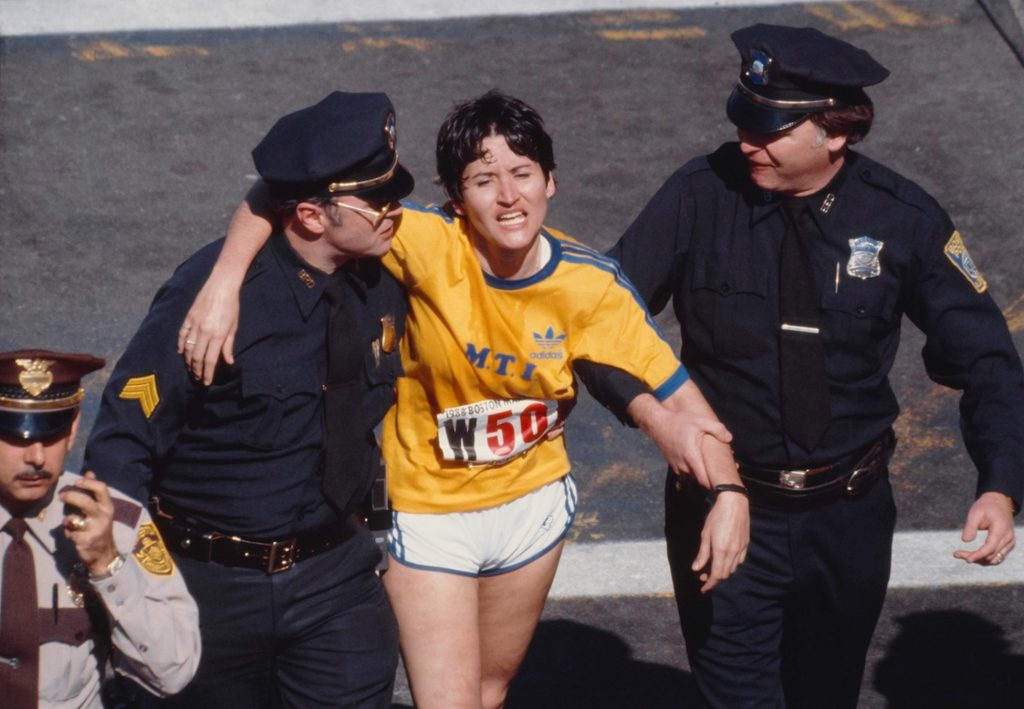
To listen to this reflection as a podcast, click here.
Rosie Ruiz was the first woman to cross the finish line of the 1980 Boston Marathon.
Her time of 2 hours, 31 minutes, and 56 seconds was extraordinary. Out of the blue, she was the third fastest female in marathon history. Heaving with exhaustion, she was escorted by two Boston police officers to the winners’ circle, where she was mobbed by reporters and race officials.
The traditional laurel wreath was placed on her head. She basked in the limelight.
Observers were surprised. “Rosie who?”
Ruiz, a New York City resident of Cuban descent, had come to town with exactly one previous marathon to her credit – the New York City Marathon the previous fall, where she had finished 11th. Boston’s race, the most prestigious in the world, annually attracts the globe’s top competitors. How had she blown past them all?
Surprise quickly morphed into skepticism. It was a hot April day in New England, but Ruiz hadn’t even broken a sweat. Her legs didn’t appear to be the lean and muscled limbs of a world-class long-distance runner. When a television reporter asked about her intervals (how fast she had run between particular points along the course), Ruiz replied, “What’s an interval?”
Race officials began to suspect they had a big problem.
Eight days later, after hearing from fellow runners that no one remembered seeing Rosie on the 26.2-mile course, and carefully studying thousands of photographs in which her face never appeared, Boston’s organizers declared her victory to be a fraud.
Investigators later concluded that Ruiz had slipped through the crowd about a half-mile from the finish line, then stepped onto the course and begun running.
Prompted by the events in Boston, New York City Marathon officials reviewed their own records and determined that Ruiz hadn’t completed that race, either. Witnesses later confirmed she had ridden the subway underneath the course, then eased through the crowd onto the street not far from the finish line.
Ruiz, who later on spent time in jail for embezzlement, insisted up to her death in 2019 that she had not cheated. But all the evidence in the world says otherwise.
In his book Run with the Horses, pastor Eugene Peterson reports that he had a number of “Rosie Ruiz’s” in his congregation.
These were the people who tended to jump into the spotlight at the last moment, just as long journeys were coming to an end. They were there for the ice cream social and the group picture at the close of Vacation Bible School, but hadn’t been around to get to know the kids. They received applause for writing the biggest checks to support world missions, but had skipped the part about praying day by day for particular missionaries.
Quaker author Thomas Kelley famously pointed out that the Christian life, first and foremost, is an actual life.
And it’s more like a marathon than every-now-and-then sprints.
When you think about it, every aspect of human character that is worth cultivating – courage in the face of trouble, resilience in the midst of disappointment, integrity in the shadow of temptation – requires a lifetime of patient obedience.
We can’t always be cutting corners and still expect to “win,” at the last moment, God’s race of becoming a whole and holy person.
The author of the book of Hebrews writes, “Therefore, since we are surrounded by such a great cloud of witnesses, let us throw off everything that hinders and the sin that so easily entangles. And let us run with perseverance the race marked out for us, fixing our eyes on Jesus, the pioneer and perfecter of faith” (Hebrews 12:1-2).
Run the whole race.
Even the miles that are tedious. Or difficult. Or shrouded in fog.
There’s something much more valuable than a laurel wreath waiting for you at the finish line.
